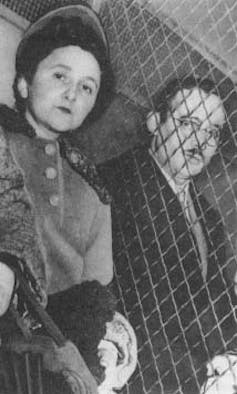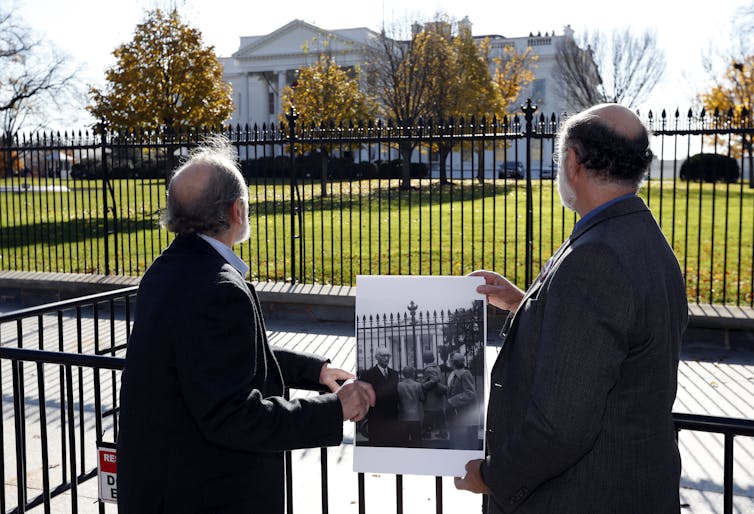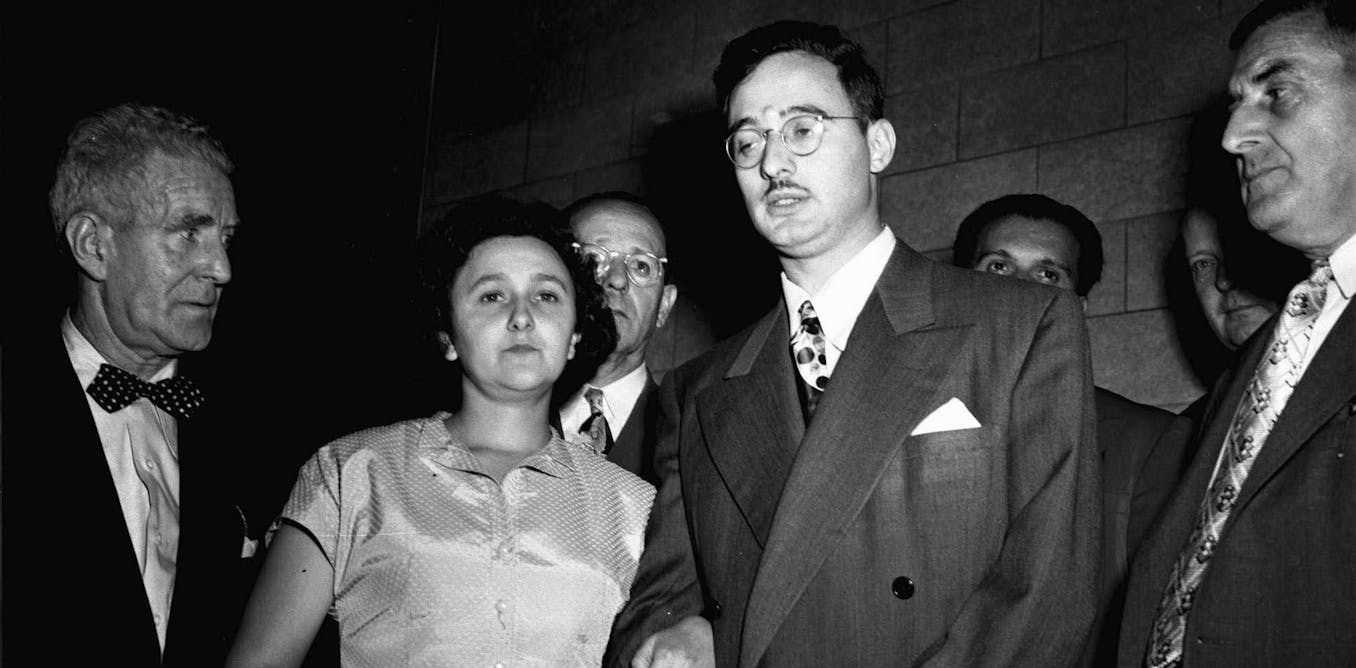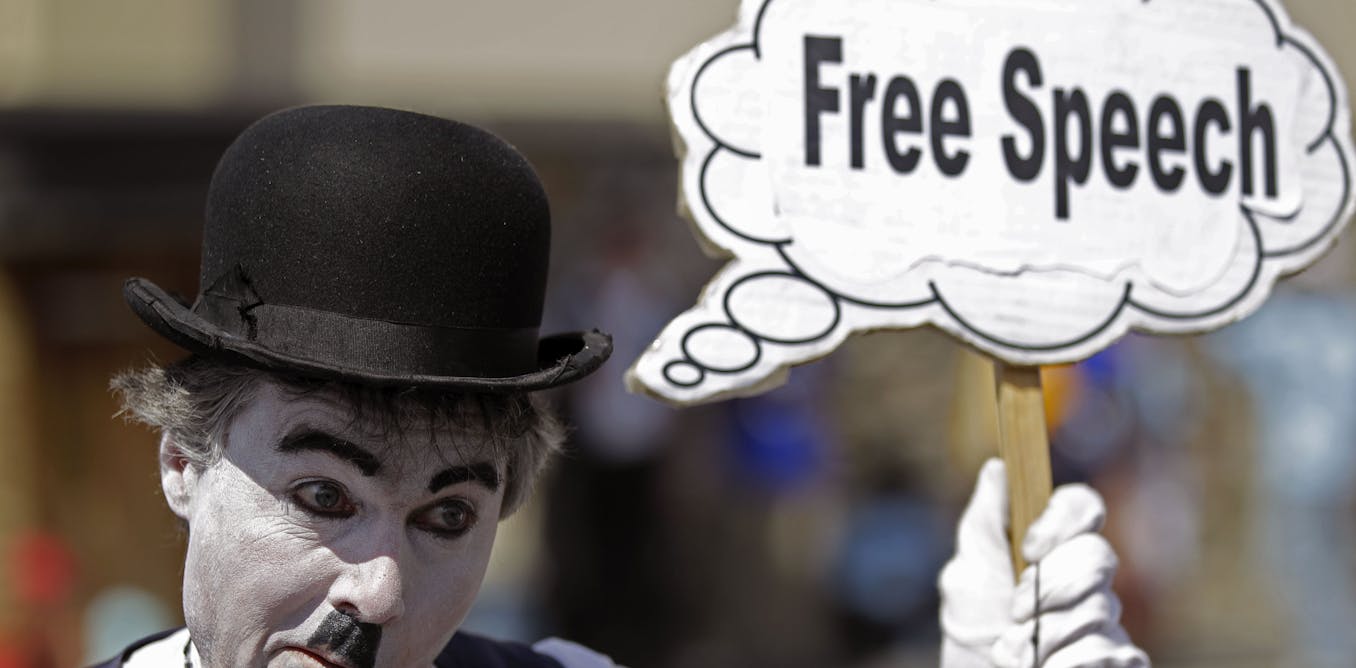The sons of an American woman executed for spying on the United States during the Cold War want President Joe Biden to clear her name before he leaves office.
Ethel Rosenberg and her husband, Julius, were executed on June 19, 1953, for conspiracy to commit espionage. They were accused of giving “the secret” of the atomic bomb to the Soviet Union, meaning they supposedly passed vital technological information to help the Soviets develop their own bomb.
As the author of a book on the Rosenberg case, I know that there was no “secret,” and that while Julius was a spy, Ethel was not.
Yet generations of Americans have learned that the Rosenbergs – both of them – betrayed their country. If now, 75 years later, we know that an innocent woman was killed, how can the government rectify this?
A miscarriage of justice that orphaned two boys
In 2015, Rosenberg sons Michael and Robert Meeropol – they took the last name of the couple who adopted them after their parents’ deaths – argued in The New York Times that their mother was wrongfully convicted and executed. They urged then-President Barack Obama to exonerate Ethel, which would officially declare her not guilty of the crime for which she was killed.
Many were sympathetic to their plea. Executing the Rosenbergs orphaned the two boys – 6-year-old Robert and 10-year-old Michael. But theirs wasn’t just an emotional plea. The facts were on their side.
AP Photo/John Lent
Documents from the case reveal that FBI Director J. Edgar Hoover knew Ethel was not an active spy. FBI agents arrested her only as leverage to pressure Julius to name his dozen or so collaborators.
An electrical engineer and devoted communist, Julius gained access to classified information while working with Emerson Radio Corp. and the U.S. Army Signal Corps. He recruited and managed a spy ring that provided whatever military information it could to the Soviet Union.
The pressure on Julius didn’t work, and he never named names. He and Ethel were electrocuted after a trial riddled with problems such as perjured testimony and an incompetent defense team.
The trial also featured inappropriate communications between the presiding judge and federal prosecutors.
Judge Irving Kaufman had lobbied to preside over the Rosenberg case, and Justice Department officials supported his selection to further pressure Julius: Kaufman was open to imposing the death penalty.
After the jury found the couple guilty, Kaufman consulted with the prosecuting attorneys to determine whether both Rosenbergs should get the same sentence. Prosecutors were reluctant to support Ethel’s execution. Judge Kaufman decided to sentence both Ethel and Julius to death anyway.
Getting it wrong
The crime for which they died was not spying but conspiracy to commit espionage. Prosecutors argued that since Ethel was cognizant of her husband’s espionage activities, she was involved in the conspiracy.
I used to think that, too.
“In all likelihood Ethel’s role in the spy ring was at least that of an aware spectator,” I wrote in a 2015 opinion piece after the Rosenberg sons requested her exoneration, “placing her inside the fluid category of conspiracy in the eyes of the law.”
I concluded that imposing the death penalty on Ethel was a “cruel and unjust act” for which the U.S. government should apologize – but not exonerate.
I was wrong.
I now believe that a presidential exoneration is appropriate and necessary because it will correct the view that Ethel was an active spy. It will address the serious flaws in her trial and conviction. And it will set right the historical record.
Many popular books, textbooks, tweets and news sites get the case wrong. They incorrectly lump Julius and Ethel together, labeling both as spies for the Soviet Union, and claim they were convicted of espionage. Time magazine once ranked the couple among America’s “Top 10 Crime Duos.”

AP Images, file
For decades, the U.S. government has gotten the facts of its own criminal case wrong, too.
The National Security Agency falsely stated in a 2018 publication that the couple were executed for treason. Even the FBI’s website incorrectly claims Julius and Ethel together ran an espionage ring that passed atomic bomb secrets to the Soviet Union.
Correcting the record
A newly declassified document clarifies the truth.
In August 2024, the Rosenberg sons obtained a handwritten memo from August 1950 authored by the NSA’s chief analyst, Meredith Gardner. He wrote that, based on Soviet intelligence, Ethel knew about Julius’ espionage work but “due to illness she did not engage in the work herself.”
This document confirms what other sources such as the FBI had already indicated: Ethel was not a spy and “did not engage in the work” of espionage and – most importantly – U.S. government officials knew it.
They knew it when FBI agents arrested Ethel on Aug. 11, 1950. They knew it when the jury convicted her nine months later. They knew it when the judge sentenced her to death on April 5, 1951. And they knew it when prison officials executed her on Friday, June 19, 1953.
Now, Michael and Robert Meeropol are using the declassified memo to urge Biden “to exonerate (Ethel) Rosenberg by issuing a formal presidential proclamation saying that she was wrongly convicted and executed.”

AP Photo/Alex Brandon
Full exoneration
I, too, have come to believe Ethel Rosenberg’s killing was a morally repugnant miscarriage of justice.
That’s why a presidential pardon by Biden, who is now contemplating his end-of-term pardon list, would not be sufficient redress. A pardon forgives someone for a crime they committed. Ethel Rosenberg did not commit the crime for which she was convicted, so it’s the U.S. government that should beg forgiveness from Ethel’s descendants.
“President Biden has the power to right this historic injustice,” said Jennifer Meeropol, Ethel’s granddaughter and director of the Rosenberg Fund for Children, on Sept. 10, 2024. Only a full exoneration, Meeropol argued, could “redress the harm done to my family and bring peace to my father and uncle in their lifetimes.”
This almost surely will not happen under President-elect Donald Trump.
Roy Cohn, Trump’s late personal lawyer, was an important member of the Rosenberg trial prosecutorial team. Cohn claimed in interviews throughout his life that Ethel “alone was the ringleader, who led Julius around by a leash.” He was wrong, but Trump won’t likely contradict his mentor.
We historians know that our understanding of the past is always evolving. When new facts cast light on a past injustice, I think we should learn from those mistakes and correct the injustices that we can.
Exonerating Ethel would be an important step toward truth. And it would correct the historical record.




